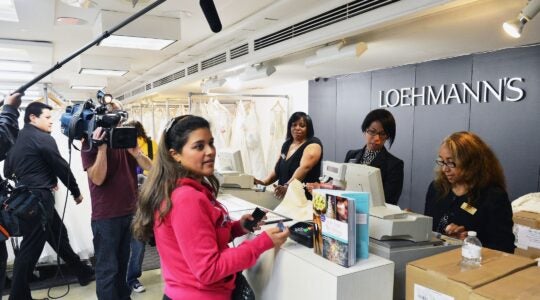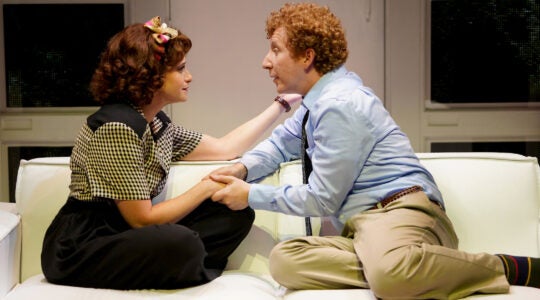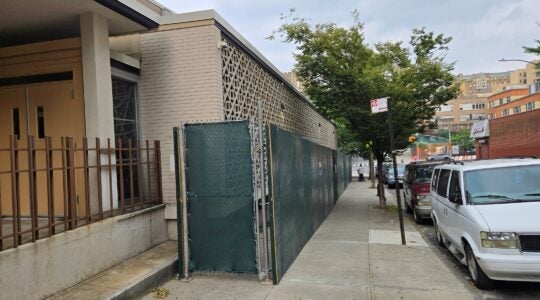Arguably one of the most memorable scenes in last year’s Oscar-nominated “A Serious Man” is the bar mitzvah, when Danny Gopnik does his Torah and Haftorah portions while visibly stoned, having smoked prodigious amounts of pot in the Hebrew school bathroom.
So accustomed are they to tuning out the foreign chanting from the bima that his parents and the other congregants in the soulless 1960s Midwestern temple don’t even seem to notice anything amiss.
If only Danny had been able to study with Amichai Lau-Lavie and his avant-garde Storahtelling troupe of actors/teachers/musicians, however, the scene might have looked quite different. The whole Gopnik family, instead of being estranged from each other, would have spent months studying Torah together. The ceremony would have been creative and engaging, with humor, music, drama, costumes — and, presumably, no need for mind-altering drugs.
Since 1999, Lau-Lavie’s Storahtelling, which calls itself a “radical fusion of storytelling, Torah, contemporary performance art and traditional ritual theater,” has been revamping the standard seven-aliyah, all-in-Hebrew leyning Torah service, bringing in live music, video and a unique blend of both respect and irreverence.
It’s not for die-hard traditionalists or those who adhere to Shabbat restrictions on musical instruments or technology use.
But the Orthodox-raised Lau-Lavie, the nephew of Israel’s former Ashkenazi Chief Rabbi Yisrael Meir Lau, says the model is grounded in authentic tradition, inspired by the ancient practice of having a “meturgeman,” someone to translate the Torah for the lay public. He began experimenting with the approach in the late 1990s, out of a feeling that the typical synagogue Torah service “was a disservice.”
“Tons of money is poured into getting Jews to study Torah” but during the Saturday morning Torah reading “when you have a full house,” the opportunity for engagement and education is often squandered, he said.
“Instead of boring rote, the ritual should be an opportunity for conversation,” he said.
Over the years Storahtelling, now based out of the 14th Street Y, has grown dramatically, performing all over the world. But Lau-Lavie, an Israeli expat, began to worry the focus was too much on theater and performance, rather than education.
“People said this is great, but then the next week it’s the same old service,” he said. “We want to make Storahtelling a methodology, a training institute.”
Toward that end, the group is training clergy and educators from all over the country on how to incorporate what Lau-Lavie calls the “Maven” approach into their services. It is also working to adapt the approach for early childhood programs. But its biggest, and potentially most revolutionary project is to reinvent the bar/bat mitzvah.
With a new project called Raising The Bar, Storahtelling seeks to make what is all too often a tedious memorization chore into an inspiring, creative coming-of-age ceremony.
And the charismatic Lau-Lavie is not afraid to slaughter some sacred cows of American bar/bat mitzvah tradition in the process, like the prevailing assumption that a bar mitzvah must learn trope, must chant Haftorah and must give a speech.
“This should be a journey, a pride-filled event from which you walk out wanting more,” Lau-Lavie says. “Is Hebrew an absolute must? I’m not sure.”
Initially viewing Storahtelling as a theater company, not a Hebrew school, Lau-Lavie was at first hesitant to go into the bar/bat mitzvah business. He rebuffed early requests from parents — some synagogue members, some not — that approached him.
But the requests kept coming, and there have now been almost 40 Storahtelling bar/bat mitzvahs, in New York, Los Angeles, London and Jerusalem. Now, Lau-Lavie is working to expand and formalize the process, having families participate in cohorts rather than individually, and partnering with synagogues.
While Storahtelling is already in discussions with Manhattan’s Congregation Habonim and Congregation B’nai Jeshurun, as well as some other congregations, how the synagogue world greets the project — a potential threat to its longtime control over the bar/bat mitzvah process as well as established traditions/norms about what the ceremony should entail — remains to be seen. For many synagogues, the carrot of a bar/bat mitzvah ceremony has long been the only way to maintain enrollment in Hebrew schools and attract a steady stream of dues-paying members.
However, Storahtelling is hardly the only potential competitor synagogues face for the bar/bat mitzvah market. In recent years, growing numbers of families have begun bypassing synagogues, opting instead to hire private tutors and hold customized ceremonies in alternative venues. Many Chabad congregations also facilitate bar/bat mitzvah ceremonies for families that do not wish to join a synagogue.
Upon learning about Raising the Bar, Evie Rotstein, project director of the Leadership Institute for Congregational School Educators, a joint project of the Conservative and Reform seminaries funded by UJA-Federation of New York, told The Jewish Week she thought many congregations would welcome it.
“I think there’s an openness to experimenting and trying different things that maybe [the Jewish community] didn’t have 10 years ago,” she said. “Institutions are willing to experiment and change the way we experience life-cycle events to really deepen the experience and make it more meaningful.”
What exactly does a Storahtelling bar/bat mitzvah look like?
For some children, working with a Storahtelling tutor has been their only Jewish education, whereas others are day school students or have years of Hebrew school under their belts. The venues have varied as well: everything from restaurants to Jewish community centers to a space in the Abraham Joshua Heschel High School to the B’nai Jeshurun sanctuary. Some kids have leyned Torah and Haftorah in typical bar/bat mitzvah fashion; others have dispensed with the Hebrew altogether. One girl is writing and performing a song about Miriam as part of her ceremony.
What all the processes have shared, however, are a minimum of several months of text study, in which the bar/bat mitzvah child and family, guided by a Storahtelling tutor, have read multiple translations and commentaries on the Torah portion, discussed how to make the messages and ideas relevant to their own lives and brainstormed creative, engaging ways of presenting the material.
Liz Stern said that during her daughter Josie’s Storahtelling bat mitzvah this winter, which involved family members enacting The Burning Bush, guests “were literally rushing to come up and be participants” in the ceremony.
“It wasn’t just about the process for me and Josie and our family, but it became a process for everybody who was able to be there that evening,” Stern said of the bat mitzvah, held at B’nai Jeshurun, where she is a member, just before Havdalah.
Storahtelling bar/bat mitzvahs, said longtime company member and bat mitzvah tutor Sarah Sokolic, are not about outsiders “coming in as performers.”
“What you really want is the families to get engaged with it,” she said. “It’s about the process not the product, even though in 90 percent of the cases the product’s phenomenal.”
“This works,” Lau-Lavie said, of his group’s emerging bar/bat mitzvah process, noting that without any advertising or recruitment, Storahtelling gets “five to 15 calls per week asking for a private bar/bat mitzvah.”
“What began as a moonlighting gig can help restructure the map of how the Jewish community deals not only with coming of age, but the entire Jewish education,” he says.
By launching Raising the Bar, Lau-Lavie hopes to bring the Storahtelling bar/bat mitzvah approach to large numbers of families — and synagogues.
Two Raising the Bar cohorts — one in L.A., one in New York —have formed for this fall, each with 12 children, a mix of unaffiliated Jews and synagogue members. In addition, Habonim and B’nai Jeshurun are sending staff members to a national Storahtelling training session in Denver this summer, and the hope is they will become pilot projects/models of how Storahtelling might be incorporated into religious school and bar/bat mitzvah prep.
“We want to make sure that when we work with a family cohort that we also work with a synagogue in the neighborhood,” Lau-Lavie said.
Rabbi Laurie Phillips, director of education at Habonim, which has approximately 10 to 15 bar/bat mitzvah ceremonies a year, said she is eager to work with Storahtelling, describing its programs as “interactive, meaningful, engaging and substantive.”
Judaism “has to be desirable to people and not necessarily in the way it was for my grandparents,” she said.
Storahtelling, whose High Holy Day services in Soho attract approximately 500 people each year, has a relatively high-profile following. Among the parents enrolling children in the new Raising the Bar cohorts, which cost $5,000 per child for a year of preparation and follow-up plus approximately $2,500 for the actual ceremony, are City Winery owner/Downtown Seder organizer (and Jewish Week board member) Michael Dorf in Manhattan and Showtime’s “Weeds” creator/executive producer Jenji Kohan in Los Angeles.
A few months ago, Jill Soloway, the co-executive producer of HBO’s “Six Feet Under” celebrated her son Isaac’s Storahtelling bar mitzvah in Los Angeles.
In it, Isaac, aided by Lau-Lavie and several relatives wearing camel costumes for the occasion, alternately chanted, discussed and performed his Torah portion, about Abraham’s servant choosing Rebecca to be the wife of the biblical Isaac (played by his bar mitzvah boy namesake).
At the beginning of the ceremony, held in an intimate courtyard adorned with plants, Lau-Lavie described the Torah as “the world’s longest running rerun.”
Soloway said that after the ceremony many guests told her it was “the first bar mitzvah where they actually knew what was going on!”
“I like how Amichai’s so joyful, so about making it kind of a party,” Soloway said, noting that “while I certainly appreciate the importance of sacred moments,” many Jews tend to make the bar/bat mitzvah process needlessly unpleasant, almost like a “hazing.”
“I was at a dinner party talking to some moms in New Jersey who were complaining about their kids hating to go to Hebrew school, hating practicing for the bar mitzvah, and I said it doesn’t have to be like that, you can do it yourself,” she said, adding “You don’t have to even chant a portion. The portion is material you’re given: make a puppet show, play, slide show — just tell the story.”
|
Signup for our weekly email newsletter here. Check out the Jewish Week’s Facebook page and become a fan! And follow the Jewish Week on Twitter: start here. |
The New York Jewish Week brings you the stories behind the headlines, keeping you connected to Jewish life in New York. Help sustain the reporting you trust by donating today.




